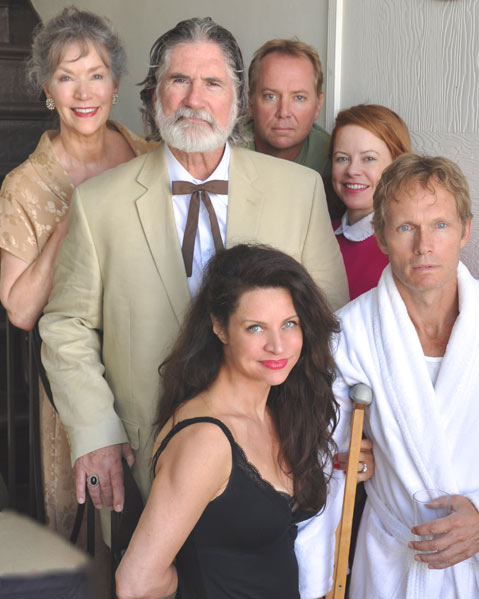Cat On a Hot Tin Roof at Center Stage Theater
Tina Arning Sizzles as Maggie the Cat in Saturday, September 15, Performance
It may only be the second-best play Tennessee Williams ever wrote, but that doesn’t mean Cat on a Hot Tin Roof is any less of an American classic. What Cat lacks in the form of kinetic energy à la A Streetcar Named Desire it more than makes up for with the faded grandeur, desperate eloquence, and tragic knowledge of its great operatic speeches. Taken together, these dramatic arias constitute a potent course of study perfect for initiating theatergoers into the higher clichés of decadence, Southern-style. As Maggie, Tina Arning gives an “actor’s actor” performance, mining the script’s carefully notated dialect for nuance and musicality. Her commanding performance of Maggie’s big speeches in Act One successfully sets the tone of this sturdy, powerful production.

As Brick, the ex-football star and alcoholic golden boy of this highly dysfunctional family, Tom Schanley radiates broken strength and raw psychic pain. His physical characterization requires both athleticism and restraint, and, by the time he has fixed his 10th or 12th bourbon neat, the audience acutely feels the deep compulsion behind his drinking and depression. It’s Schanley’s patient performance that gives Arning the necessary platform from which to portray Maggie’s yearning for a better, more fulfilling life. Together they travel the long road mapped out by the play’s action, from a beginning that’s mired in hatred and fear to an ending that’s cautiously, if still ironically, optimistic.
Along the way, Maggie and Brick meet with their fair share of obstacles, first in the form of Brick’s brother, Gooper (Dave Zyler); his wife, Mae (Heidi Brook Myers); and their children, the infamous “no-neck monsters” of Maggie’s initial diatribe. Both Myers and Zyler are excellent in these crucial supporting roles, delivering just the right mixture of justified resentment toward Brick and Maggie and ill-considered criticism and negativity. If these characters could leave well enough alone, one finds oneself thinking, they might have a chance, but not if they continue to overreact and overreach.
The show’s second big set of speeches comes in Act Two, when Big Daddy (Mitch Carter) attempts to plumb the depths of Brick’s alcoholic depression. Carter kvetches and roars, alternately picking at the unexplained threads of his son’s situation and reflecting on his own lost opportunities. What emerges is a portrait of the Southern gentleman as a victim of his own grandiosity and controlling nature. Too used to getting his way, Big Daddy has relinquished the ability to connect with those closest to him, and as a result, he yearns to make up for lost time. There’s a cloud of death that hangs over him, but in the meantime, he asserts himself in every way he can, including pressing his son Brick for an explanation of his self-destructive behavior. When Big Daddy finally does break down Brick’s defenses, the confessions he hears come at a terrible cost.
The play is famous for its meditation on the role of mendacity in the family, and as Big Mama, Rosemary Alexander must embody this principle of refusing to accept the truth. She’s a great character, stubbornly attached to the status quo. Confronted with the reality of her worsening situation, Big Mama, like Big Daddy, is only too happy to accept the willful trick that Maggie plays on them all to give the play’s action its ironic closure. Cat on a Hot Tin Roof remains one of the greatest American plays, and we are fortunate to have this excellent production in town for another weekend.



